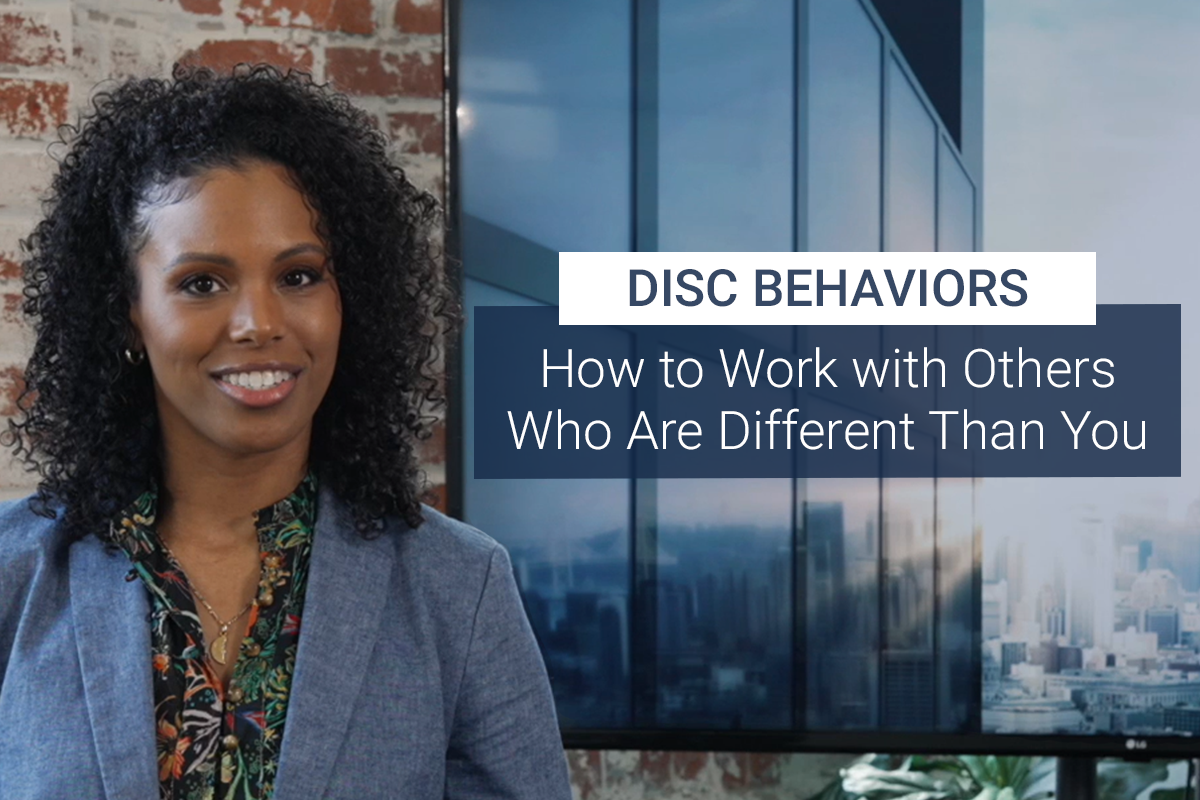Your ability to interact with others could be the difference between success and failure in your personal life and in your work life.
“Behavioral research suggests that the most effective people are those who understand themselves, both their strengths and weaknesses, so they can develop strategies to meet the demands of their environment.” (TTI Success Insights LTD)
A person’s behavior is a necessary and integral part of who they are. We know that people tend to be active or passive depending on the perception of their environment. The DISC report measures 4 dimensions of behavior. Here is a quick summary of those four dimensions.
D - Dominance
“D” stands for dominance. It represents how you respond to problems and challenges. The higher the “D” score, the more aggressively you take on a challenge. Someone with a lower “D” score tends to be more reflective in their response.
I - Influence
The “I” stands for influence. It reflects how you attempt to influence others to your point of view. A higher “I” is more optimistic and trusting, whereas the lower “I” may behave in a more realistic and pessimistic manner.
S - Steadiness
The “S” represents steadiness. This reflects your consistency and how you respond to the pace of the environment. The high “S” prefers a more predictable environment where they can finish what they start, while the lower “S” prefers a faster pace.
C - Compliance
The “C” stands for Compliance. This represents how you respond to rules and procedures set by others. The high “C” tends to follow the rule, while the low “C” tends to question the rule.
Three Principles True of Every Person
Here at The Center Consulting Group, when we work with different organizations, we go in-depth to help them understand each member of their team so they can work more effectively together. For today’s purposes, here are three principles that will cut through it all, no matter what your style is.
1. Know your behavioral style.
Knowing your behavioral style will allow you to know yourself better and become cognizant of how you show up in different situations.
2. Recognize the behavioral style of others.
This will allow for a greater understanding of team members and help your organization to capitalize on each person’s value to ensure that they are an integral part of your team.
3. Understand how to adapt your style.
Adapting your style will allow for greater, more effective communication and relationships.
At the end of the day, what is most important is that we appreciate and are sensitive to what we all bring, whether someone is a D, I, S, or C. We have to realize that we generally try to make others more like us, and we all have blind spots. We often joke that it's not personal, it's personality!
I have witnessed our clients grow their effectiveness, both in their personal and professional lives, as they better understand their strengths and weaknesses and learn to value the differences of others. Let us know how we can serve you and your team.
Contact us to learn more about how our experienced consultants can facilitate in-depth training for your team on the topic of civil discourse.
Eryka Jenkins, M.Ed., brings experience in the areas of education, diversity and inclusion training, building culture, conflict management, and team building. Her previous experiences include working in education where she built community among students and partnered with faculty and division leadership to build cultural competency. A former Division 1 athlete, Eryka is also a certified strength and conditioning specialist, has crafted and led strength programs for various sports teams, and has served as a sports coach for over 10 years. She has an M.Ed. in Educational Leadership from Lehigh University, a Bachelor’s Degree in Hospitality Resort Management and Business from the University of Memphis, and a diversity and inclusion certificate from Cornell University.




![Leadership: How to Be a World Class Boss [VIDEO]](https://images.squarespace-cdn.com/content/v1/571fc0ea1d07c0fd6d72c167/1744640489138-X5LUNZT3JTRQYSSZXV1C/boss+thumbnail.png)
![Conflict: The Importance of Having Tough Conversations [VIDEO]](https://images.squarespace-cdn.com/content/v1/571fc0ea1d07c0fd6d72c167/1741365599296-KTWEJ5PTNH1BX2GJ9REJ/Conversations+blog.png)
![Exit Planning: The Challenge of Business Exit Planning & Why It Matters to You [VIDEO]](https://images.squarespace-cdn.com/content/v1/571fc0ea1d07c0fd6d72c167/1738339040891-VIW87N2NCZUCKLYNOHB6/exit+blog.png)

![Teams: Is Your Team Dysfunctional? [VIDEO]](https://images.squarespace-cdn.com/content/v1/571fc0ea1d07c0fd6d72c167/1733243870005-NOI69Z74DLNVLIB8MRRJ/dysfunctional+blog.png)
![How to Recruit and Inspire Volunteers [VIDEO]](https://images.squarespace-cdn.com/content/v1/571fc0ea1d07c0fd6d72c167/1728421227208-6JAUFVXEJW5KK6YE58JR/volunteers+blog.png)
![Trust: 4 Steps to Rebuild Damaged Trust [VIDEO]](https://images.squarespace-cdn.com/content/v1/571fc0ea1d07c0fd6d72c167/1725969594417-7AN9PJO2X8TTR77ACDFP/trust+blog.png)
![Blind Spots: How to Identify & Avoid Blind Spots in Your Organization [VIDEO]](https://images.squarespace-cdn.com/content/v1/571fc0ea1d07c0fd6d72c167/1722610352594-FAXECLPC61QYJH2I5YT8/blind+spot+blog.png)
![Family Business: Will the Family Business Destroy Our Family? [VIDEO]](https://images.squarespace-cdn.com/content/v1/571fc0ea1d07c0fd6d72c167/1718027719043-MU9AYPTQ7GM4XWT9EGD1/destroy+blog.png)
![Teams: How to Breathe New Life into a Broken Team [VIDEO]](https://images.squarespace-cdn.com/content/v1/571fc0ea1d07c0fd6d72c167/1714749389916-G2CWVK8OM1JJSD9058CL/breathe+blog.png)
![Planning: The Power of Planning [VIDEO]](https://images.squarespace-cdn.com/content/v1/571fc0ea1d07c0fd6d72c167/1712597764732-WHRZPRLZ6V78CBGKBPZA/PLanning+blog.png)
![Leveling Up Your Leadership: Becoming an Effective Senior Leader [VIDEO]](https://images.squarespace-cdn.com/content/v1/571fc0ea1d07c0fd6d72c167/1710266273593-QN3HEBJ5FII4GKQFH91Q/leveling+up+blog.png)
![Recruiting & Retaining “Mature” Team Members [VIDEO]](https://images.squarespace-cdn.com/content/v1/571fc0ea1d07c0fd6d72c167/1707849950823-Y5WJLYXM6ZPU55TKG27Y/recruitment+blog.png)

![Gaslighting: How to Identify It & Take Back Control [VIDEO]](https://images.squarespace-cdn.com/content/v1/571fc0ea1d07c0fd6d72c167/1699381799669-Y6XNYG2X3ZD1US80XAFY/Gaslighting+blog.png)
![Decision-Making: Why Smart Leaders Do Dumb Things [VIDEO]](https://images.squarespace-cdn.com/content/v1/571fc0ea1d07c0fd6d72c167/1696947285846-ZIA5M26B5AF9SRFGWFPV/Dumb+Things+blog.png)

![Meeting Effectiveness: 4 Different Types of Meetings & Why It Matters [VIDEO]](https://images.squarespace-cdn.com/content/v1/571fc0ea1d07c0fd6d72c167/1690296011536-23CWWE2VJ40QJ0UA1EZY/meetings+blog.png)
![Leadership: 4 Directions You Need to Lead [VIDEO]](https://images.squarespace-cdn.com/content/v1/571fc0ea1d07c0fd6d72c167/1689105063370-WQTIN47T3TP8YXQM3RMP/directions+blog.png)
![Leadership Model: Are You a Cheerleader, Drill Sergeant, or Coach? [VIDEO]](https://images.squarespace-cdn.com/content/v1/571fc0ea1d07c0fd6d72c167/1686670057921-DJ286QE8OZOQKE22SZAL/coach+blog.png)
![Developing Women Leaders: The Power of Leader Efficacy [VIDEO]](https://images.squarespace-cdn.com/content/v1/571fc0ea1d07c0fd6d72c167/1683572272369-EJ4N7BBXL0832YUM4XUN/Women+efficacy+blog.png)


![Innovation: How To Make Innovation Part of Your Leadership [VIDEO]](https://images.squarespace-cdn.com/content/v1/571fc0ea1d07c0fd6d72c167/1675365017628-0ZAPR2WCAM23JVDHM34I/Innovation+blog.png)
![Civil Discourse Part 2: 3 Cognitive Skills to Help You Understand Different Perspectives [VIDEO]](https://images.squarespace-cdn.com/content/v1/571fc0ea1d07c0fd6d72c167/1673898642478-RKKE5JM6YMMKG460MCOD/Civil+Discourse+Cognitive+Skills+blog.png)
![Civil Discourse Part 1: 3 Emotional Skills to Engage With Those You May Not Agree With [VIDEO]](https://images.squarespace-cdn.com/content/v1/571fc0ea1d07c0fd6d72c167/1667851162605-2PANA7ZP4DAWH0WI7V3B/Civil+Discourse+Emotional+Skills+blog.png)
![Coaching: Leadership Coaching for High Performance [VIDEO]](https://images.squarespace-cdn.com/content/v1/571fc0ea1d07c0fd6d72c167/1665424350332-LKS9SEVB9T8ZPOOMVSAT/Coaching+blog.png)
![Family Legacies in the Workplace [VIDEO]](https://images.squarespace-cdn.com/content/v1/571fc0ea1d07c0fd6d72c167/1663246593252-EGUEIAVMWS491D6F9GK8/Family+Legacies+blog.png)

